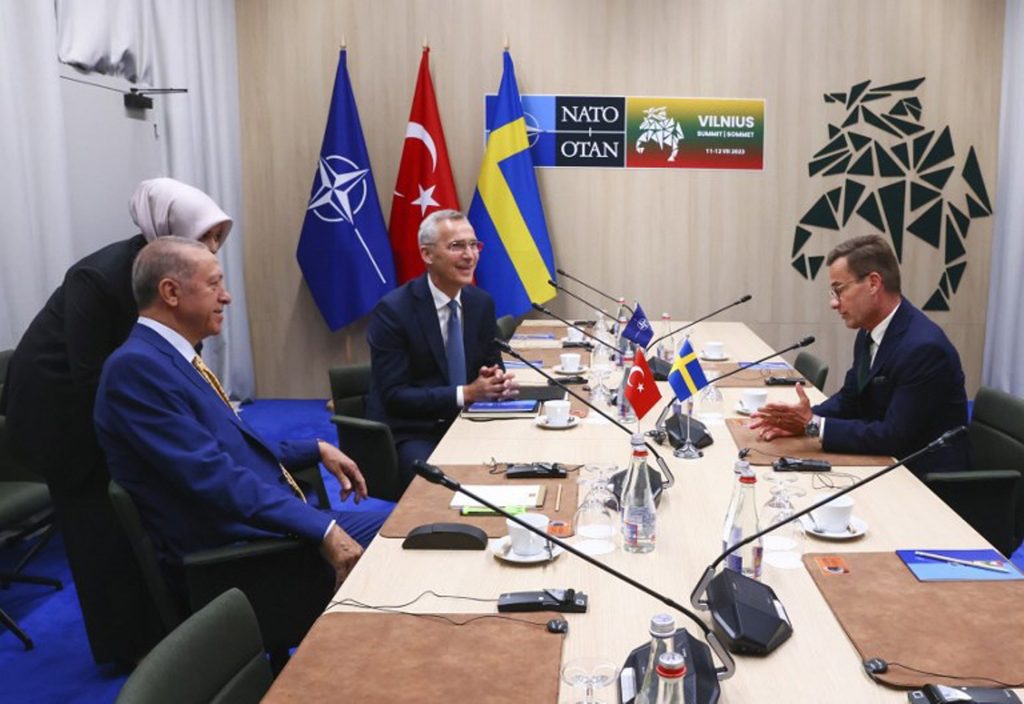Belgium and other NATO allies on Monday welcomed Turkish President Recep Tayyip Erdogan's decision to lift his opposition to Sweden's NATO accession application and to submit it to the Turkish parliament for ratification.
Erdogan's decision ended a year-long stalemate caused by Ankara's opposition to Sweden's accession to the alliance.
Earlier on Monday, Erdogan had raised the the stakes by calling for a reopening of Ankara's EU accession negotiations. However, NATO Secretary-General Jens Stoltenberg later announced that an agreement had been reached.
NATO summit 'marks its first success'- P.M. De Croo
Sweden will become a "full member of Nato," Stoltenberg announced on Monday evening after a meeting with Erdogan and Swedish Prime Minister Ulf Kristersson ahead of this week's NATO summit in Lithuania.
"Glad to announce that after the meeting I hosted with R.T. Erdogan and Swedish P.M., President Erdogan has agreed to forward Sweden's accession protocol to [Turkey's] Grand National Assembly as soon as possible and ensure ratification," the NATO head tweeted. "This is an historic step which makes all NATO allies stronger and safer."
Belgian Prime Minister Alexander De Croo was among the first NATO leaders to welcome the breakthrough. "Sincere thanks to S.G. Stoltenberg for his relentless efforts," De Croo tweeted. "With this, the NATO summit in Vilnius marks its first success!"
Ankara commits to helping ensure ratification
US President Joe Biden also welcomed the new development. " "I stand ready to work with President Erdogan and Turkey on enhancing defence and deterrence in the Euro-Atlantic area," he said in a statement. "I look forward to welcoming Prime Minister Kristersson and Sweden as our 32nd NATO ally."
According to a joint statement issued after Monday's meeting, Erdogan undertook to transmit Sweden's accession protocol to Turkey's Grand National Assembly (parliament) "as soon as possible." Ankara "will work closely with the Assembly to ensure ratification," the joint statement agreed by the three interlocutors stated.
Stoltenberg, however, refused to mention any deadline to the press, explaining that it was up to the Turkish parliament to complete the process and definitively ratify Stockholm's membership of the Atlantic Alliance.
New bilateral Security Compact against terrorism
"Since the last NATO summit," held in Madrid, "Sweden and Turkey have worked closely together to address Turkey's legitimate security concerns," the statement read. "As part of this process, Sweden has amended its Constitution, changed its laws, significantly expanded its anti-terrorist cooperation against the PKK and resumed arms exports to Turkey, all measures set out in the trilateral memorandum agreed in 2022."
Erdogan's year-long opposition to Sweden's accession bid had centered on what he claimed was Swedish support for organisations such as the Kurdistan Workers Party, PKK, which Ankara describes as a terrorist group.
According to the text, Sweden and Turkey agreed "to continue their cooperation under both the Trilateral Permanent Joint Mechanism established at the Madrid NATO Summit 2022 and a new bilateral Security Compact that will meet annually at ministerial level, and create working groups as appropriate."
"At the first meeting of this Security Compact, Sweden will present a roadmap as the basis of its continued fight against terrorism in all its forms and manifestations towards the full implementation of all elements of the Trilateral Memorandum," the statement added.
Economic cooperation dividend
Sweden reaffirmed in the statement that it "does not provide support to the YPG," a Kurdish militia Turkey considers a terrorist organisation, and two other groups: the Democratic Union Party, which dominates the Kurdish-majority region of northeastern Syria, and the movement of Fethullah Gülen, an imam accused of fomenting the attempted coup in 2016 in Turkey.
Sweden and Turkey further agreed that counter-terrorism cooperation is a long-term effort, which will continue beyond Sweden's membership of NATO. Stoltenberg announced a "considerable" intensification of NATO's work in this area, including the creation by the Secretary General, for the first time in the Alliance, of a post of Special Coordinator for Counter-Terrorism.
According to the statement, Sweden and Turkey also agreed to intensify economic cooperation, through a bilateral Joint Economic and Trade Committee.
"Both Turkey and Sweden will look to maximise opportunities to increase bilateral trade and investments. Sweden will actively support efforts to relaunch Turkey's EU accession process, including the modernisation of the EU-Turkey customs union and visa liberalisation," the text stressed.
EU, Turkey agree to 'reinvigorate'relations
This appears to be a response to the link drawn by Erdogan between a green light for Sweden's NATO membership and the reopening of EU-Turkey negotiations on possible membership of the European Union.
"First open the way for Turkey's membership of the European Union and then we will open the way for Sweden, just as we have opened the way for Finland," Erdogan had said before flying to Vilnius, prompting astonished reactions from his allies.
For his part, the President of the European Council, Charles Michel, said after a separate meeting with Erdogan that the two sides had agreed to "reinvigorate" relations between Turkey and the EU.
Negotiations between the two sides have been at a standstill for years. Ankara applied for membership of the European Economic Community in 1987 and the EU in 1999, but the accession negotiations begun in 2005 have been plagued by a series of thorny issues and a lack of commitment from key EU countries.

